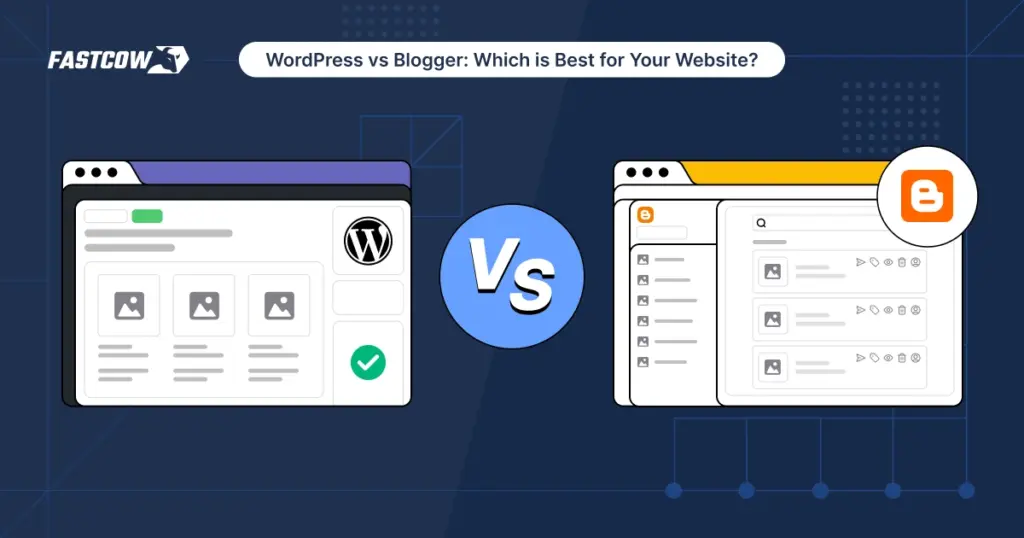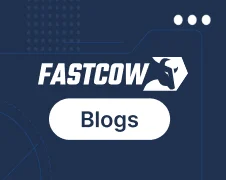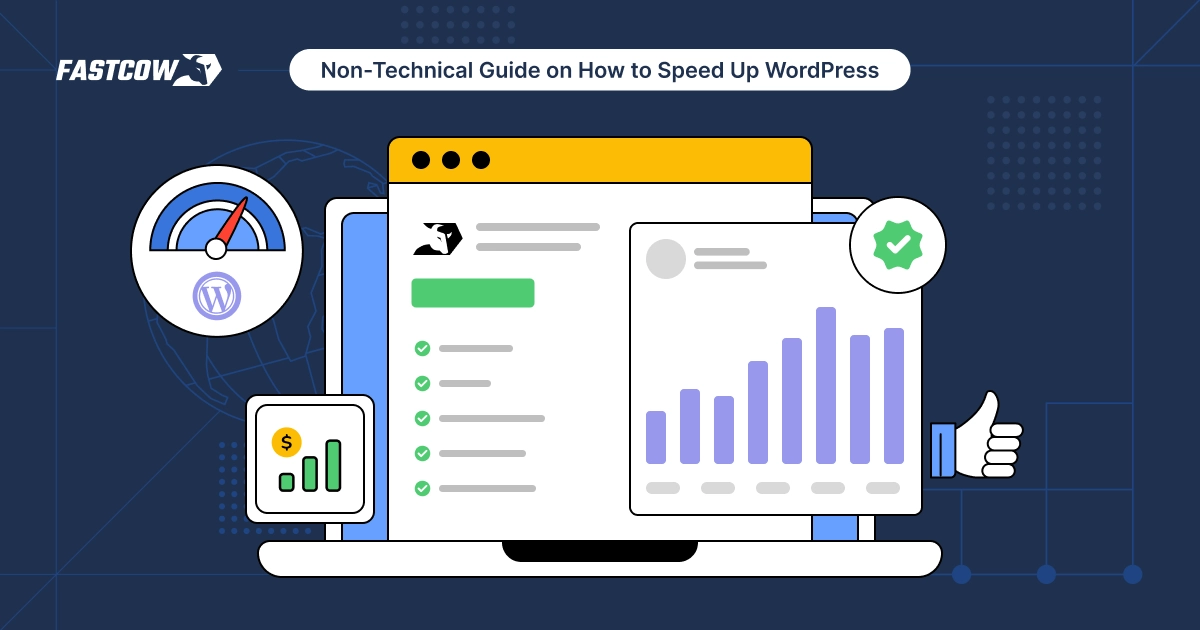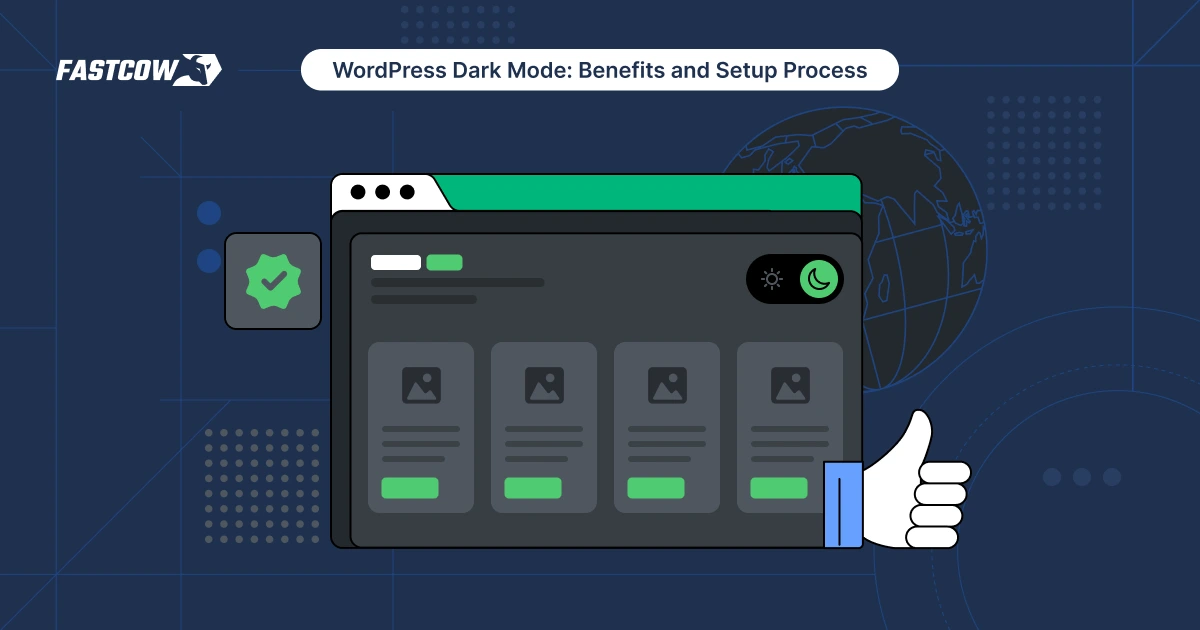
Blogging is still one of the most effective ways to share ideas, build an audience, and grow a business. Today, two platforms dominate the blogging world—WordPress and Blogger. But which one should you choose?
Blogging itself holds immense value in the digital space. 89% of content marketers rely on blog posts as a top priority. Whether you’re a hobbyist looking to share personal stories or an entrepreneur aiming to monetize your ideas, picking the right platform is crucial.
This article delves into Blogger vs WordPress, which is better, comparing them across critical areas. By the end, you'll know which platform suits your needs best. Let’s unravel the details and help you make an informed decision.
WordPress vs Blogger: 10 Key Differences
Choosing the right platform is crucial for your success. Here are the 10 key differences between WordPress and Blogger to help you make an informed decision.
Ownership and Control
Ownership matters when building a blog. It affects your control over your content and your platform’s future.
Blogger: Limited Ownership
- Blogger is hosted by Google, meaning Google owns the platform. Your content exists on their servers. You have limited options if Google decides to discontinue Blogger or changes its policies.
- You can’t access core files or make significant structural changes to your blog. This limits flexibility.
- You own the content you post, but since the platform is not self-hosted, you risk losing your work more. Google can suspend or delete your blog if it violates its terms.
WordPress: Full Ownership
- WordPress.org is self-hosted, meaning you control where your content lives. You own everything—from the content to the domain.
- You can select your hosting provider, access website files, and modify them to fit your needs.
- This independence also allows for advanced customizations. You can tweak themes, add new features, or back up your site.
- Unlike Blogger, you’re not tied to the rules of a larger company. You decide how your site grows.
Verdict:
If you must own your blog and content, WordPress is the better choice. Blogger is great for beginners, but its hosted nature limits long-term control. With WordPress.org, you own your content, website, and future.
Ease of Use
How easy a platform is to use can make or break your blogging experience, especially if you’re new.
Blogger: Simplicity First
- Blogger focuses on simplicity. Signing up is easy, especially if you already have a Google account.
- The dashboard is straightforward. You can create, edit, and publish posts in minutes, and no coding knowledge is needed.
- It’s perfect for beginners who want a straightforward experience. Features like automatic updates and basic templates make it hassle-free.
- However, simplicity comes at a cost. Blogger offers limited tools and customizations, and you might feel restricted as your skills grow.
WordPress: Learning Curve but Greater Potential
- WordPress.org requires more effort to set up. You must purchase hosting, install WordPress, and choose a theme. While this sounds daunting, there are countless guides and tutorials to help.
- The platform is designed for flexibility. It allows you to create any website, from a simple blog to a full-fledged e-commerce store.
- WordPress supports drag-and-drop page builders like Elementor, making customization easier over time. It also offers plugins for added functionality.
- While the interface may initially seem complex, it grows with you. Beginners can use the basic features, while experts can explore advanced tools.
Verdict:
Blogger wins for simplicity and speed. However, if you’re ready to invest time in learning, WordPress’s potential far outweighs its initial challenges. For those planning a long-term, scalable blog, WordPress offers unmatched versatility.
Customization Options
Customization defines how your blog looks and functions. It directly impacts user experience and branding.
Blogger: Limited but Simple
- Blogger provides a handful of pre-built templates. These are simple and user-friendly but lack variety. Most templates feel dated and basic.
- You can adjust basic elements like fonts, colors, and layouts. However, advanced customization options are limited unless you dive into HTML and CSS coding.
- Adding new features or functionality is challenging. Blogger doesn’t support plugins, so you’re restricted to the platform’s built-in tools.
- This simplicity benefits beginners who prefer not to deal with complex designs. But as your blog grows, the limitations become apparent.
WordPress: Unlimited Possibilities
- WordPress.org offers unmatched customization. With thousands of free and premium themes, you can design your blog to suit your style and niche.
- Plugins expand functionality. From SEO tools to e-commerce integrations, there’s a plugin for everything.
- Page builders like Elementor or Divi allow drag-and-drop customization, even for users without coding skills. For those who code, WordPress lets you edit every detail of your site’s files.
- Customization doesn’t stop at design. You can optimize your blog’s speed, add social media integrations, and build scalable features as your audience grows.
Verdict:
Blogger keeps things simple but restrictive. WordPress shines when customization and scalability matter. WordPress wins hands down if you want a unique, branded blog with room to grow.
Pricing and Costs

Your budget plays a significant role in choosing the right blogging platform. Let’s break down the costs.
Blogger: Affordable and Free
- Blogger is free to use. You get hosting and a “.blogspot.com” subdomain at no cost.
- If you want a custom domain, you’ll need to purchase one separately. This usually costs $10 to $15 annually.
- The platform has no hidden costs, making it ideal for hobby bloggers or budget-conscious users.
- However, the “free” nature limits advanced features. Without plugins or premium tools, your blog may eventually feel basic.
WordPress: Investment with Value
- WordPress.org itself is free. However, you need to pay for hosting, which starts at $5 to $15 per month for shared plans and goes up for advanced options.
- A custom domain typically costs $10 to $15 per year. Premium themes range from $30 to $100, while plugins, depending on their functionality, may cost $5 to $100 annually.
- These costs add up, but they provide more value. You get complete control, scalability, and professional features.
- WordPress allows you to choose cost-effective solutions. For instance, free themes and plugins can reduce expenses, making them accessible to a wider audience.
Verdict:
Blogger is cost-effective and perfect for personal or small-scale projects. WordPress requires an investment, but the returns are worth it. WordPress delivers exceptional value if you aim to grow your blog and use advanced features.
SEO Features
Search Engine Optimization (SEO) is vital, as nearly 68% of all online experiences start with a search engine. Blogger and WordPress provide SEO tools, but their flexibility and effectiveness vary greatly.
Blogger: Basic SEO, Limited Control
- Blogger offers basic SEO features. You can edit meta descriptions, add alt text for images, and create simple sitemaps. These features help but don’t go far enough for competitive niches.
- Since Google owns Blogger, it’s optimized for Google’s algorithms out of the box. However, the lack of advanced SEO tools limits how much control you have over your rankings.
- URLs in Blogger often include date stamps, which can look messy and hurt SEO efforts. For instance, instead of a clean structure like “yourdomain.com/post-title,” you might get “yourdomain.com/2023/12/post-title.”
- Customizing on-page SEO, like headings and internal linking, is manual and less intuitive than WordPress.
- Blogger doesn’t support SEO plugins, which makes it harder to implement advanced strategies like keyword targeting or structured data markup.
WordPress: Advanced and Comprehensive
- WordPress excels in SEO thanks to plugins like Yoast SEO and Rank Math. These tools guide you step by step to optimize your content, from keywords to meta descriptions.
- You can create clean permalink structures that look professional and enhance search engine visibility. Categories and tags further organize your site, improving user experience and SEO.
- Breadcrumbs, an essential SEO feature, are easy to implement in WordPress. They provide better navigation for users and search engines.
- WordPress allows full control over your robots.txt file and sitemap, giving you the power to manage indexing and crawling effectively.
- Advanced SEO tactics like adding schema markup, optimizing loading speeds, and integrating with Google Analytics are seamless in WordPress.
Verdict:
If SEO is a priority, WordPress is the clear winner. Its plugins and customization options allow you to rank higher and attract more organic traffic. Blogger works for beginners but falls short in competitive SEO.
Monetization Potential
Monetization turns your blog into a source of income. Blogger and WordPress offer ways to make money, but WordPress provides far more opportunities.
Blogger: Limited Options
- Blogger allows monetization through Google AdSense. Once approved, you can display ads on your blog. However, the platform’s limited design options make it hard to optimize ad placements for maximum revenue.
- Affiliate marketing is possible, but Blogger doesn’t support link cloaking or advanced integrations. You’ll need to rely on basic tools like Bitly, which don’t inspire much trust from readers.
- Selling products or services is challenging. Without built-in e-commerce tools, you must use external solutions that aren’t always seamless.
- Blogger’s lack of flexibility restricts its monetization potential. While you can generate some income, scaling up is tough.
WordPress: Endless Opportunities
- WordPress supports many ad networks beyond AdSense, including Mediavine and AdThrive. You can customize ad placements with plugins like Ad Inserter to maximize revenue.
- Affiliate marketing thrives on WordPress. Plugins like Pretty Links let you cloak and track links, improving conversions.
- WordPress makes setting up an e-commerce store with plugins like WooCommerce easy. The platform adapts to your needs, whether you sell physical goods, digital downloads, or subscriptions.
- You can monetize through membership programs, courses, or even gated content using tools like MemberPress or LearnDash.
- WordPress allows for direct monetization of your site. Once your blog grows, you can sell it as a valuable asset on platforms like Flippa.
Verdict:
For serious bloggers aiming to make money, WordPress is the ultimate choice. It offers diverse monetization options, scalability, and the ability to turn your blog into a full-fledged business. Blogger’s simplicity suits hobbyists, but it limits earning potential.
Data Portability
Data portability is essential when planning to switch platforms or backup content. Blogger and WordPress handle this differently, and their approaches impact flexibility.
Blogger: Limited and Complex
- To export data from Blogger, you must download an XML file. While this works, it is often incompatible with other platforms. During the migration, you may lose some formatting or metadata.
- The process can be time-consuming if your blog has many posts, images, or customizations. Blogger does not prioritize seamless transitions, making moving to platforms like WordPress or Squarespace more challenging.
- Since Blogger primarily caters to beginners, it assumes users will stay within its ecosystem. This results in fewer tools to simplify exporting content.
- If you plan to migrate, be prepared for potential manual adjustments, especially with media files or embedded links.
WordPress: Seamless and Flexible
- WordPress excels at data portability. The built-in Export Tool generates a complete XML file of your content, including posts, pages, comments, and custom fields, ensuring smooth data transfer.
- The platform’s open-source nature promotes compatibility. Moving to another CMS or even back to WordPress is straightforward.
- Plugins enhance the process. For example, All-in-One WP Migration allows backups and easy migrations to other hosting providers or platforms.
- WordPress lets you download your database, giving you full control over your site’s content and structure. This adds a layer of security and peace of mind.
- WordPress makes the process user-friendly and reliable whether you want to switch platforms or consolidate backups.
Verdict:
Blogger may suffice for simple setups, but WordPress leads in data portability. If flexibility and future-proofing matter, WordPress provides unmatched convenience and reliability.
Community and Support
WordPress powers a staggering 43.1% of all websites on the internet. On the other hand, Blogger, managed by Google, remains a favorite among beginners. Despite a slight dip from the previous month, it attracted 30.1 million visits in November 2024.
The strength of a platform often lies in its community and support system., which affects how easily you can troubleshoot issues and learn new skills.
Blogger: Small and Limited
- Blogger has a smaller user base compared to WordPress. This means fewer forums, tutorials, or third-party resources for troubleshooting problems.
- The platform provides basic help through Google’s support channels. While helpful, these resources lack depth, especially for complex issues.
- Blogger’s dated ecosystem limits active engagement. Many users have shifted to more modern platforms, reducing community growth.
- Finding experts or developers familiar with Blogger can be challenging. This is especially true if you want to customize your site beyond basic templates.
WordPress: Extensive and Vibrant
- WordPress boasts one of the largest online communities. Millions of users, developers, and designers actively contribute to its ecosystem.
- You’ll find extensive documentation on WordPress.org. This includes detailed guides, how-tos, and FAQs for every feature.
- Forums and Q&A sites like Stack Exchange discuss virtually every WordPress issue. Whatever your problem, someone has likely solved it before.
- Third-party resources like video tutorials and blogs make learning WordPress accessible. Platforms like YouTube and Udemy offer courses for all skill levels.
- For premium themes or plugins, many developers offer dedicated support channels. This ensures personalized help when needed.
Verdict:
WordPress’s thriving community and abundant resources make it ideal for users seeking guidance and support. Blogger’s limited ecosystem works for beginners but falls short for those looking to grow their skills or site.
Scalability
Scalability determines how well a platform grows with your needs. Blogger and WordPress cater to different expansion levels, making this an essential factor in your choice.
Blogger: Limited to Personal Use
- Blogger is great for personal or hobby blogs. It offers simplicity but lacks advanced features for growth.
- The platform doesn’t support complex structures like professional portfolios, e-commerce, or large-scale websites.
- The templates and plugins are minimal, so customizing them for scaling is challenging. You can’t easily add advanced features like membership systems or multi-page layouts.
- Storage and resource allocation depend entirely on Google’s framework. You may encounter restrictions when handling high-traffic or additional media files.
WordPress: Built for Growth
- WordPress is designed to scale. You can start with a basic blog and expand into a full-fledged business website.
- Plugins like WooCommerce transform your site into an e-commerce platform. Others, such as MemberPress, enable memberships and subscription systems.
- WordPress lets you upgrade hosting plans. Shared hosting suffices for starters, but you can switch to VPS or dedicated servers for high-traffic sites.
- Scalability also applies to design. Premium themes and page builders like Elementor adapt to more complex needs as your site evolves.
- WordPress integrates with third-party tools like CRM software, email marketing platforms, and analytics tools to handle growth efficiently.
Verdict:
Blogger suits small-scale bloggers, while WordPress thrives in scaling up for professional needs. WordPress provides the flexibility and features you’ll need if growth is part of your vision.
Content Backup and Security

The ability to secure and back up content safeguards your hard work. While around 91% of businesses back up databases. Blogger and WordPress approach this critical aspect very differently.
Blogger: Automated but Limited
- Blogger relies entirely on Google for backups and security. This automation ensures minimal effort on your part.
- Google’s infrastructure provides a secure hosting environment. It handles basic security measures like spam filtering and HTTPS encryption.
- Backups, however, lack flexibility. While you can export blog content as an XML file, media files, and custom settings may not transfer smoothly.
- You’re dependent on Google. If Blogger ever discontinues its service or faces technical issues, restoring your site could become challenging.
WordPress: Customizable and Robust
- WordPress requires manual or plugin-based backups. Tools like UpdraftPlus and BackupBuddy simplify the process, allowing automated schedules and cloud storage integration.
- Security is highly customizable. Plugins like Wordfence and iThemes Security can help you implement firewalls, two-factor authentication, and malware scanning.
- Unlike Blogger, WordPress empowers users to control backup frequency and storage locations. You can back up content, themes, and databases independently.
- Hosting choice impacts security. Managed WordPress hosting services often include daily backups, DDoS protection, and other advanced security measures.
- Regular updates to WordPress core, themes, and plugins help maintain a secure site. The active community ensures vulnerabilities are addressed quickly.
Verdict:
Blogger offers hassle-free backups and basic security but lacks flexibility. WordPress demands more effort but rewards you with robust, customizable options to secure your content. For long-term reliability and control, WordPress stands out.
Here’s a summary table of the 10 differences:
| Aspect | Blogger | WordPress |
| 1. Ownership and Control | Hosted by Google; limited control over content and platform. | Self-hosted (WordPress.org) offers full ownership and control. |
| 2. Ease of Use | Beginner-friendly with a simple interface; minimal learning curve. | Steeper learning curve but offers extensive guides and flexibility. |
| 3. Customization Options | Limited themes and basic templates. | Thousands of themes, plugins, and advanced customization. |
| 4. Pricing and Costs | Free platform with optional custom domain costs. | Hosting, domain, and plugin costs; more value for customization and scalability. |
| 5. SEO Features | Basic SEO tools rely on Google algorithms. | Advanced SEO control with plugins like Yoast and Rank Math. |
| 6. Monetization Potential | Limited to AdSense and basic affiliate marketing. | Wide monetization options include ads, e-commerce, and digital products. |
| 7. Data Portability | Exporting content is complex and may result in data loss. | Easy data export ensures flexibility for platform changes. |
| 8. Community and Support | Smaller community with limited resources. | Large community with extensive documentation, forums, and third-party support. |
| 9. Scalability | Ideal for personal or hobby blogs; limited for professional growth. | Built for growth; supports professional blogs, business websites, and e-commerce. |
| 10. Content Backup & Security | Automated by Google but offers limited flexibility. | Requires plugins or manual backups; customizable security measures ensure robust protection. |
How to Decide: Blogger or WordPress?

Choosing between Blogger and WordPress depends on your goals, technical skills, and long-term plans. Both platforms offer unique benefits to different user types.
Beginners and Hobby Bloggers: Go with Blogger
Blogger is perfect if you’re new to blogging or simply want a space to share your thoughts. It’s easy to set up and doesn’t require technical skills. You can create a blog within minutes using your Google account. Blogger’s interface is clean and straightforward, allowing you to focus on content creation without worrying about complex configurations.
- Cost: Blogger is entirely free unless you opt for a custom domain. For many beginners, this eliminates barriers to entry.
- Ease of Use: The platform is intuitive, making it ideal for those who don’t want to deal with learning curves or backend setups.
- Maintenance: Google handles updates, hosting, and security, so you don’t need to manage technical details.
However, Blogger comes with limitations. Customization options are minimal, and scalability is restricted. It’s great for personal use but isn’t suited for those planning to monetize or grow a professional blog.
Professionals and Business Users: Choose WordPress
WordPress is the best option for anyone serious about blogging or building a business online. WordPress offers unmatched flexibility and control whether you create a personal brand, an e-commerce store, or a professional website.
- Customization: WordPress.org allows you to build unique, feature-rich websites with thousands of themes and plugins. You can design your site to meet specific needs.
- Monetization: It supports multiple revenue streams, from ads to digital product sales, making it ideal for business growth.
- Scalability: As your website grows, WordPress grows with you. Add advanced features or switch themes without limitations.
- SEO and Analytics: Plugins like Yoast SEO empower you to optimize content for search engines. You can also integrate analytics tools to track and improve performance.
The initial WordPress setup requires effort, including purchasing hosting and a domain. However, the long-term benefits far outweigh the initial investment.
Final Thoughts
Choosing between Blogger and WordPress depends on your goals and plans. Blogger works well for beginners or casual users who value simplicity and free access. It’s also easy to set up and maintain, making it perfect for hobbyists. However, its limited customization and scalability may hold you back if you want to grow.
WordPress, on the other hand, is built for ambition. It offers unmatched control, flexibility, and professional-grade tools. WordPress delivers the resources you need to succeed, whether aiming for a personal blog, business site, or an e-commerce platform.
At FastCow, we understand the challenges of choosing the right platform. That’s why we’re here to help. Explore our hosting solutions and expert tips to ensure your blogging journey starts on the right note. Let’s turn your vision into reality.
FAQs
Q. Which gives more money, WordPress or Blogger?
WordPress offers monetization options like affiliate marketing, e-commerce, and ad networks. Blogger is limited to AdSense and basic affiliate links. WordPress is the better choice if you’re serious about earning from your blog.
Q. Does anyone still use Blogger?
Yes, Blogger has a loyal user base, mainly hobbyists and beginners. Its simplicity and free access appeal to those who don’t need advanced features.
Q. Is Blogger still relevant in 2024?
Blogger remains relevant for casual blogging. While it’s outdated compared to modern platforms, it suits users seeking a no-cost, low-effort option for personal blogs.
Q. Do people still use WordPress for blogs?
Absolutely! WordPress is the go-to platform for blogging. It powers over 43% of the web and remains the top choice for professional bloggers and businesses.
Q. Is WordPress dying out?
No, WordPress is thriving. Its versatility and open-source community ensure it stays relevant. It continues to dominate the CMS market and evolves to meet user needs.
































